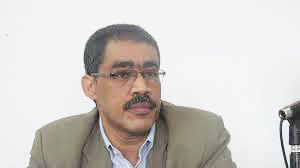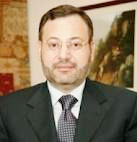President Morsy, the Muslim Brotherhood, and newly appointed Prime Minister Hesham Qandil, remain the focus of opinion writing. The relationship between the Muslim Brotherhood and the Egyptian intelligentsia has raised the concern of many who are fearful of Islamists excluding opposing voices within the art and culture realm. Meanwhile, it is suggested that the possibility of an escalation of the power struggle between SCAF and the Muslim Brotherhood could prove costly to the Brotherhood in particular and Egypt in general. Others criticise the current Labour Union, seen as a Mubarak-era relic used to suppress labour activism, and warn President Morsy against continuing Mubarak’s policies towards Egyptian labourers. Morsy’s radio address to the people was also criticised, compared against similar examples in America and France. Last, some pro-Islamist voices defend Hesham Qandil’s beard, and his qualifications and ability to fill the role of heading the cabinet.
 Mohamed Salmawi
Mohamed Salmawi
The president and hostility towards intellectuals
Al-Masry Al-Youm newspaper
In his column, Mohamed Salmawi criticises President Morsy and the Muslim Brotherhood for creating a hostile relationship with Egypt’s arts and culture sector.
The author warns the President against continuing a long history of antagonism between the Brotherhood and artists, thinkers and writers.
Salmawi cites the exclusion by the Brotherhood of prominent artists and writers nominated by the Egyptian Writers Federation from the Constituent Assembly as evidence of the Brotherhood’s attitudes towards the arts.
He criticises Morsy for ignoring intellectuals and writers in his first public speeches, preferring instead to praise tut-tuk and taxi drivers.
Salmawi notes that Morsy has held meetings with representatives from most of the different professional syndicates but not the Egyptian Writers Federation.
He maintains that these examples indicate a poor relationship between the Muslim Brotherhood and Egypt’s intellectuals that could prove costly.
The president and the radio
Dalia Shams
Al-Shorouk News
Dalia Shams discusses the initiative launched by President Morsy to conduct a daily encounter with the people in his ‘The People Ask and the President Answers’ radio programme.
She recalls that the first initiative of this kind was introduced by American President Franklin D. Roosevelt, which he started in the first week of his presidency.
Roosevelt addressed the American nation in direct language, carefully worded to be understood by all social strata. He explained his reform policies to revive the US economy after the stock market crash of 1929.
Roosevelt’s programme succeeded in delivering his message to the nation, gaining him popular confidence outside of traditional press channels.
Prime Minister Pierre Mendès France of France latger adopted Roosevelt’s radio strategy.
He explained to ordinary citizens why their income had decreased, and what macro-economic strategies could be adopted to raise living standards without recourse to autocratic Soviet-style measures. Mendès France won over French public opinion, and used this to buttress his parliamentary front.
Shams observes that the timing of Morsy’s programme, directly after Iftar, when everyone is busy watching Ramadan TV shows, is less than ideal. She also suggests that Morsy would benefit from adopting a more creative and modern style of speech during the programme.
 Diaa Rashwan
Diaa Rashwan
Dialogue before the crisis
Al-Masry Al-Youm newspaper
A face off between the Supreme Council of Armed Forces (SCAF) and Morsy and the Muslim Brotherhood may be imminent according to Diaa Rashwan.
Dissecting the the hidden conflict of appointing the new Ministers of Defense, Interior and Foreign Affairs, he argues that the appointment of a new Minister of Defense without consultation with SCAF could lead to conflict.
If Morsy does not seek the approval of SCAF did in the appointment of a Defence Minister, the armed forces will consider this a breach of its addendum of the constitutional declaration.
The Supreme Administrative Court’s verdict on the second Constituent Assembly is expected imminently according to Rashwan, and he warns its future may be in jeopardy.
If the court orders the dissolution of this committee, SCAF will then have the ability to reform the body with a makeup more favourable to its interests.
To avoid an unnecessary showdown, Rashwan urges Morsy and the Muslim Brotherhood to seek the input of SCAF in the appointment of the Defence Minister.
 Morsy and the official Labour Union
Morsy and the official Labour Union
Emad Al-Din Hussein
Al-Shorouk News
Emad Al-Din Hussein questions the credibility of a promise by official Labour Union head, Ahmed Abdel-Zaher, to President Morsy to halt the confrontation between revolutionist and political powers.
Abdel-Zaher is skeptical of this promise, pointing out that the leadership of the Labour Union was not elected and was instead appointed by the Mubarak regime with the aim of undermining genuine labour movements.
He questions its efficacy, arguing that not only did the Mubarak-era Labour Union fail to protect its guardian regime from being overthrown, but that it also let down that regime who had mobilized the Labour Union members in the Battle of the Camel.
Hussein denounces the reduction of the labour crisis in Egypt as a marginal skirmish between the Mahalla Spinning and Weaving workers and the state, and asserts that the workers issue is Egypt’s issue.
The worst is yet to come he says, if President Morsy and Prime Minister Hesham Qandil resort to copying Mubarak’s socioeconomic policy, by assigning more credit to certain businessmen on the expense of national capital, trade unions, and masses of producers and marginalised operatives.
 The prime minister’s beard
The prime minister’s beard
Ahmed Mansour
El-Watan News
Following what he describes as an unfounded media offensive against the newly-appointed Prime Minister Hesham Qandil, Ahmed Mansour rejects the criticism of the Prime Minister’s beard, saying this deliberately ignores his experience and capacities.
In light of speculation about Qandil’s affiliation with the Muslim Brotherhood, these voices accused Morsy of breaking his promise to appoint a Prime Minister not belonging to the group.
Mansour points out that The New York Times stated that while Qandil is a religious person, he does not belong to the Muslim Brotherhood.
He also cites American Secretary of State spokesperson Victoria Noland who praises Qandil’s qualifications, noting that he has received both his MSc and PhD degrees in the United States.
Mansour rejects this sort of criticism as ignoring Qandil’s experience with the Nile file, and recalls similar attacks on the bearded Prime Ministers of Tunisia and Morocco, Hamadi Jebali and Abdelilah Benkirane.
Mansour, who is himself bearded, asserts that the beard is a sign of manhood, and that secularist media should not criticise those who choose to grow one.
He suggests people should stop wasting time discussing personal choices, and to show instead focus on Qandil’s ability to lead the government at this critical phase.



